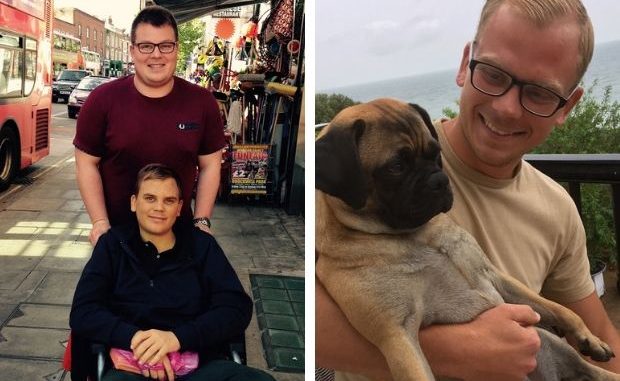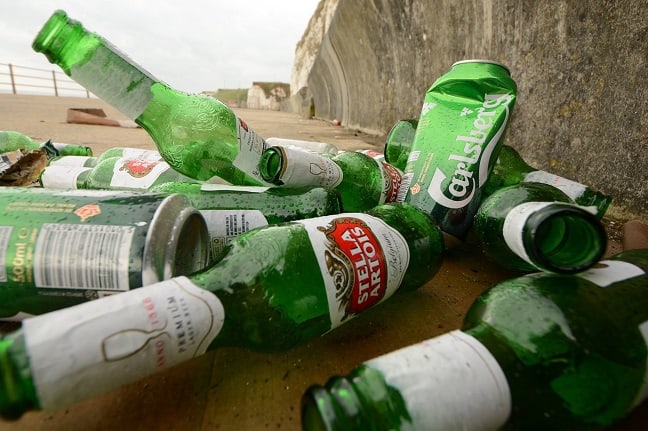
Broadstairs builder Toby Winson recently won Media Trust’s annual ‘Breaking into News’ competition and is on the path to a new career in broadcast journalism.
He won the title after creating a news report, with the help of a professional ITV mentor, on educating schoolchildren about the dangers of alcohol.
It is something the 29-year-old knows from the inside after battling with an addiction that took him through a bleak cycle of drinking, detox, rehab and relapse and almost ended his life.
But Toby’s courage has helped him on to the path of recovery and he celebrated three years sobriety last month.
Now he hopes his blog, Recovery Boy, and future opportunities will mean he can help others fight their addictions.

Here is his story:
“I had no hope, no emotion. I had had enough of the alcoholism and the carousel,”
Toby Winson was just 25-years-old and in King’s College Hospital with potential liver failure due to his addiction.
His skin and eyes had gone yellow and doctors were not sure he would survive.
He had been drinking strong cheap cider from morning until night because he could not function without the alcohol and could no longer afford the bottles of vodka that he’d previously consumed. He’d lost his job and had destroyed relationships with his family.
It was one of the lowest points in Toby’s life – and yet it was not enough to stop him drinking.
By this point he had been in rehab twice, been hospitalised some 20 times, undergone detox with the drug Librium and suffered withdrawal symptoms -delirium tremens or DTs – resulting in terrifying hallucinations.
The beginning
Toby’s descent into addiction began as a young teenager drinking with friends but soon turned into something much darker.
Toby said: “From the age of 14 I preferred being drunk, it made everything better. Later I went to uni in Hertfordshire and managed to come away with a 2:1 in business and economics but during my final year I went through the DTs (withdrawal) for the first time. I knew nothing about withdrawal symptoms until it happened to me.
“I went cold turkey but was then seeing all these things, faces in the windows and cobwebs around my legs, things flying from the ceiling.
“Then there was this 8ft man trying to kill me and I ended up running up the road into traffic with just my trousers on in November.
“I thought I had lost my mind.”
Toby ended up at the police station and paramedics were called, instantly recognising the symptoms of alcohol withdrawal.
Addiction
By the age of 20 Toby was drinking a bottle of vodka every night and then he began to drink in the mornings.
He said: “I knew my drinking wasn’t normal but wouldn’t admit I was an alcoholic. It was when I was about 22 or 23 that I knew I was an alcoholic and I went to rehab in Maidstone for the first time.
“I wanted to stop but the addiction is so powerful and it becomes a big part of your life, slipping back is so easy. The first time in rehab I was 100% committed but I made a fundamental mistake, I got a thought in my head that I could just have a drink like normal people. I was about halfway through rehab but the thought in my head just got bigger and bigger and I ended up planning my first drink, where I would go, how I would hide it. When I started to drink the only way I would stop would be hospitalisation, I’d end up there and get detoxed.”
By the age of 25 Toby was living in a flat in Broadstairs but had lost his landscaping job, lost family connections and was drinking cheap, strong cider.
He said: “I had gone yellow, I didn’t really notice it but other people did. I was getting up in the morning and making myself sick so I could get some drink inside me to keep off withdrawal and then I noticed my eyes were yellow. That shook me up.”
It was then that Toby ended up at King’s College. He said: “At that point I did not care what happened to me, I was just happy to be in a safe place. I was told there was a chance I would not come out, I didn’t know if I was going to survive.”
The hospital found that Toby’s liver was enlarged, fatty and scarred but he did not have cirrhosis.
Journey to recovery
The cycle continued until one day in August 2016 Toby decided it had to stop, and acceptance was the key to moving forward as well as rebuilding relationships with his mum and dad, Gaynor, and Barry, brother Joe, 31, and sister Charlie, 24.
He said: “I had to completely accept that I could never drink socially, that’s just something I can’t do.
“I had a support network and the biggest thing was talking about it. For the first 18 months I just had to get my head straight. For years I had been blocking out emotion and then I was hit with a tidal wave of anxiety.
“I knew I wanted to do something, that those 6-7 years of drinking would not just mean nothing.”
Toby began writing his blog, Recovery Boy, giving a frank account of his journey.
He said: “Writing the blog is about all my mistakes and experiences and everything I do now to stay sober. I hope it will help other people to not go down that path. Writing the blog has been good for my recovery, it’s good to unload.
“Some people are embarrassed about being in recovery but if you have beaten an addiction, that shows enormous strength, bravery, courage and character.”
The blog led to Toby’s discovery that he had a talent for writing and his mum entered it in the Media Trust competition.
It gave Toby the opportunity to work with ITV journalists including Sarah Saunders and Chloe Oliver. The win has now spurred him on to apply for an ITV trainee scheme.
He said: “It all came from the blog and now it is something I really want to do. Before, I didn’t even know who I was because I had been drowning myself in alcohol for such a long time.
“I have rebuilt bridges with my family and it is so positive to have their trust in me again after all they went through, the sleepless nights, the worry and the heartbreak.
“They’ve been incredible and now I just want to pay them back.”.
Find the Recovery Boy blog here
Alcohol addiction hitting the isle

Thanet has the highest rates in Kent of deaths due to liver disease caused by alcohol, booze induced mental health hospital admissions and admissions to hospital for alcohol-related conditions.
The isle also has the second highest number of deaths in the county directly related to alcohol consumption, the highest rate being in Folkestone.
On the front line of Thanet’s struggle with alcoholism and addiction is Margate’s QEQM Hospital’s Alcohol and Substance Misuse Team.
The two-person team is led by Julie Blake, a nurse with 26 years experience including in QEQM’s intensive care, with Vicki Ladner, who has a primary care background.
The duo work with up to 70 patients a week, being called in by other wards and A&E to see a patient if alcohol or drugs are the underlying reason for a hospital admission.
Team leader Julie said: “We will have a look at the severity and identify what the patient came in with. It may be dual complex needs, they might have been sectioned and need psychiatric services or they may be someone who just wants to stop drinking and is in withdrawal.
“Some people want to stop drinking and have put themselves into alcohol withdrawal, possibly putting their lives at risk. When the alcohol levels drop there is a risk of seizure, respiratory problems and cardiac arrest.
“It is balanced on priority. We do intervention, which could be ten minutes or two hours, and look at blood results, fluids, medication. Then, working in conjunction with doctors, we look at whether they are medically fit for discharge or if the patient remains in they will get allocated a ward for a detox programme.
“When people are fit for discharge we will work with care navigators and refer to The Forward Trust which is the community side of this.”
Claiming lives
For some the help works, others find themselves back in the same environment, with the same triggers, and relapse.
Julie said: “The Forward Trust is stretched. We try and get people on the grid but as I tell them ‘we can take you to the bridge but you have to cross it.’
“A lot of patients know what the triggers are, they know what it is doing to them but it doesn’t stop them and you know, ultimately, it will claim their lives.
“We have lost some patients, some quite young, and that is sad.”
The alcohol and substance misuse team was set up in 2014 as a two-year pilot with funding from Kent County Council. It was based on national and Thanet-specific alcohol abuse data.
Funding now comes from East Kent Hospitals’ urgent care budget but the team, which Julie has been with since the beginning, has been reduced from four to two.
Julie and Vicki now seeing more women drinking the same volume as men and say although there is a reduction in the number of youngsters dealing with alcohol problems this is against a rise in drug use within the age group.
Health education
She also says official figures probably don’t reveal the extent of the problem with many ‘hidden drinkers’ and cultures which will deal with it within the community rather than using the NHS.
She said: “I do not think things will change any time soon. We need to be able to get the story and issues of the dangers of drinking and dependence out there. It doesn’t take long to become a dependent drinker.
“It all has to start with health education and it has to be government led. There needs to be a real drive.”
Julie says higher taxes on cheap alcohol may be part of the answer. Currently six litres of 7.5% alcohol volume cider is cheaper than a Big Mac. The mum-of-two also says pubs need to take ownership and recognise when a person is drunk and possibly vulnerable,it is time to stop serving them. Shops also play their part in the sale of alcohol.
She added: “There is also not enough money in the services.”
Despite that it is a role that Julie says is rewarding, adding: “We do enjoy it, we have a good rapport with a high percentage of patients and we will be firm but fair. We have to be frank and honest, if someone asks if they will die we have to say it could happen. We give the facts but we do not take away hope.”
Get help
The Forward Trust provides drug and alcohol treatment services throughout East Kent. The service has five main bases, including a hub in Thanet.
A spokesperson said: “Last year we supported over 1,500 people in East Kent to address their drug and alcohol issues, over 500 of whom were based in Thanet. We are always trying to find new and better ways to support people and last year piloted a new Alcohol Pathway programme in our Thanet service, which has now been rolled out across the entire service.
“ If you are worried that you or someone you love who lives in the area might have issues with drugs or alcohol and needs support, please call 0300 123 1186 or email [email protected].”
The figures

The isle has the highest number in the county of benefit claimants unable to work due to their addiction at 177.4 per 1,000 population aged 16-64. This is compared to 90.2 for Canterbury and 61.2 for Dover.
Thanet has the highest rate across Kent of hospital admissions due to alcohol related conditions at 490.8 per 1,000 population compared to 403.8 for Canterbury and 361.9 for Dover. During 2017/18 Thanet recorded 3,128 alcohol related admissions.
For hospital admissions due to alcohol related mental and behavioral disorders Thanet again has the highest rate across Kent at 74.1 per 1,000 population compared to 37.3 in Dover.
Intentional alcohol self-poisoning rates in Kent are highest in Maidstone, followed by Thanet and then Canterbury.
Thanet again tops the county for the number of years of life lost due to alcohol and alcohol specific deaths also hit Thanet hard with the second highest rates across Kent just behind Folkestone.
Thanet is hit hardest in Kent for rates of liver disease deaths due to alcohol at 16.4 per 1000, followed by Folkestone at 16.1. The lowest rate is for Maidstone at 6.1. In 2017 there were 92 alcohol deaths recorded for Thanet.
Hospital admissions due to alcoholic liver disease are again high in Thanet, with only Medway and Dartford having more people affected,
The district is also the second highest in the county for hospital admissions due to accidental injury related to drinking.
The figures are contained in a report to the Kent and Medway Health and Wellbeing Board.
Public Health budgets include contracts to deliver alcohol and other drug treatment services. These are valued at £13m for Kent
The Kent Police and Crime Commissioner contributes to the provision of these services through a grant of £394,049 to Kent per year.

